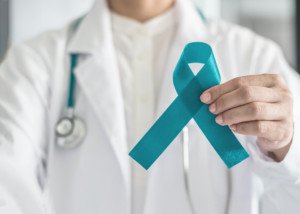Sometimes ovarian cancer is caught early, even very early. Yet this disease is notorious for being caught in an advanced stage, which is why the 5-year survival rate is about 48 percent.
“Ovarian cancer is often asymptomatic in its early stage,” says Karen Patrusky, a board certified OBGYN and F.A.C.O.G. in private practice for 20+ years.
“When symptoms do occur, they are often nonspecific and sometimes subtle.
“OC is not the most common gynecologic cancer, but it is considered to be an aggressive ‘silent killer,’ and that is because it’s typically diagnosed at an advanced stage.
“Less than the 25% of cases are diagnosed in its early stage when it’s more easily treated and cured.”
Early catches are usually the result of an incidental discovery of a mass or “cyst” on an ovary during a pelvic ultrasound for an unrelated reason, such as a pregnancy.
An MRI will pick up the ovaries if a patient is undergoing imaging for a groin injury from sport.
Another reason ovarian cancer may be caught early is if a woman undergoes an ultrasound after learning a family member has the disease or she has tested positive for a BRCA mutation.
“Patients may ignore symptoms and self-treat, and doctors would not put ovarian cancer as the most likely diagnosis for these symptoms,” says Dr. Patrusky.
“It often takes several visits to discern the diagnosis; diet changes, antacids and behavioral modifications are tried before an imaging study of the pelvis is performed.”
The “Ovaries First!” Mentality
Don’t be passive if you have a new, unexplained symptom that you’ve been trying to convince yourself is the result of something benign such as “indigestion.”
Trust your gut and intuition. There’s no law binding you to see a gastroenterologist before you see a gynecologist.
Treatment for indigestion, colitis, IBS or some other benign possibility can always wait.
Treatment for ovarian cancer CAN’T.
Now of course, it’s a safe bet that blood in your poops isn’t from ovarian cancer. Common sense dictates that you should immediately make an appointment with a gastroenterologist.
Stealth Symptoms
If you have persistent, even vague or subtle symptoms … get your ovaries checked FIRST.
“When the diagnosis is made and it’s realized that it’s in an advanced stage, a pelvic mass is noted often along with ascites, an accumulation of fluid in the abdominal cavity, and metastasis — spread to other organs are noted,” explains Dr. Patrusky.
“It is a result of these findings that cause the symptoms.
“The abdominal distention, early satiety, heartburn and pelvic pressure are all a result of a mass or fluid exerting pressure.”
Annual Ultrasounds of the Ovaries?
This sounds like a logical approach to catch this killer early. But it’s not that simple.
“Routine screening is ill advised because of the high incidence of false positives which can lead a woman to unnecessary surgical procedures,” says Dr. Patrusky.
A benign ovarian cyst can mimic a malignant tumor. There are features of an ultrasound study that can strongly suggest cancer, but the diagnosis is never made with any kind of imaging study.
Only a biopsy – from a tissue sample obtained by surgery – can confirm a diagnosis.
Very unfortunately, medical science has not caught up to ovarian cancer. And nobody knows just when that day will come that an extremely reliable early detection tool will be developed.
In the meantime, says Dr. Patrusky, “Women need to listen to their bodies, and if symptoms persist then they need to advocate for themselves.”
Hemp as a treatment?
Hemp is part of the cannabis family and is an intriguing area of study for the treatment of ovarian cancer.
Hemp comes from the marijuana plant. It is not addictive and does not cause changes in mental status.
Hemp may have the ability to one day treat ovarian cancer, say researchers at Wasana Sumanasekera at Sullivan University College of Pharmacy in Kentucky, in a 2018 report.
However, unlike marijuana, the therapeutic potential of hemp has not been studied in detail.
Research is scant, but hopes are high among these researchers.
Dr. Patrusky is the developer of Voila Intimate Mood Oil, a 100% organic, non-hormonal lubricant made from coconut oil infused with the purest natural herbal oils. All five formulas are vegan, cruelty-free and U.S. produced. Voilamoodoil.com
 Lorra Garrick has been covering medical, fitness and cybersecurity topics for many years, having written thousands of articles for print magazines and websites, including as a ghostwriter. She’s also a former ACE-certified personal trainer.
Lorra Garrick has been covering medical, fitness and cybersecurity topics for many years, having written thousands of articles for print magazines and websites, including as a ghostwriter. She’s also a former ACE-certified personal trainer.
.











































